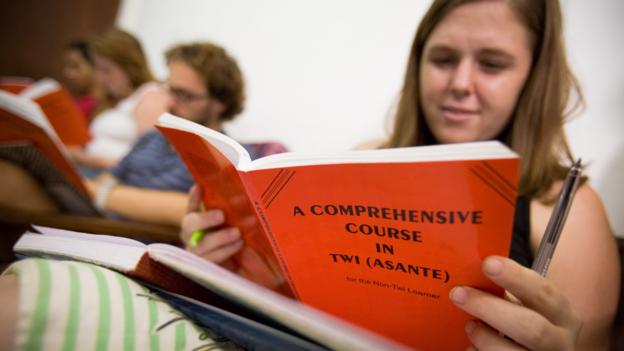你的孩子想出国留学?先看这篇文章
BBC凯特·阿什福德 (Kate Ashford),2016年2月6日

格雷西·列斯戈 (Gracie Riesgo) 的儿子叫亚历克斯 (Alex),今年 19 岁,是大二学生,但他就学期间并不会拿脏衣服回家洗,因为他在西班牙马德里上学,和美国加州的父母老家距离将近 6000 英里,还要飞越大西洋。
对于儿子想要去西班牙留学的愿望,列斯戈是这样认为的:“他有旅行家情结,一直在寻找机会去旅行。我们起初不同意。我们认为作为一个新生,这对他来说太难了。他从小到大都没独立生活过。但这对每个人都很好的人生体验。我的儿子的确已经长大成人了。”
经济合作与发展组织 (OECD) 称,就全球而言,有近 430 万的学生都在国外上大学。国际学生比例最高的国家包括澳大利亚、英国、瑞士、新西兰和奥地利(按降序排列),一半以上的外国学生是亚洲人。
美国国际教育协会 (IIE) 高等教育国际关系中心副总裁丹尼尔·奥伯斯特 (Daniel Obst) 说:“每个想要在全球商界取得成功的学生都应出国留学。用人单位需要的是可以在跨国团队中工作、懂多种语言、能够轻松跨时区工作、具有从国外学习而来的灵活性和适应性的毕业生。”
如果你将要上大学的孩子正在考虑去其他国家学习一段时间或在其他国家上大学,你应了解以下事情。
出国留学需要什么:你的孩子要学会自立,能够自己照顾自己,因为他们可能要去到一个离家人或朋友数千英里的地方,去到一个当地语言可能与自己语言完全不同的地方。语言技能即使不是绝对必要的,也是有利的,而解决问题的能力是必需的。
你需要准备多久?由于不同国家有不同的申请要求和时间表,你和你的孩子应在有意出国留学时就开始研究留学项目,尤其是在你的孩子打算通过申请助学金或奖学金来完成学业以及该国需要签证的情况下。
马上着手准备:开始研究留学课程。世界各地有许多学位难易程度和学时各不相同的留学项目。有些项目用英语授课。有些项目允许学生同时获取两所学校的学位。有些学校教育严格,有些学校则没那么严格。
美国大学专家、《大学解决方案》(The College Solution) 一书的作者、儿子和女儿均去国外留过学的林恩·奥肖内西 (Lynn O’Shaughnessy) 说:“我认为很多留学项目都相当容易实现,你不禁会想,出国留学真的会是很好的学习经历吗?你确实需要了解留学项目的性质。”IIEpassport.org、IESabroad.org 和 StudyAbroad.com 等网站是很好的着手点。
了解是否提供学分转移。如果你的孩子不在国外拿学位,而是只去国外学习一学期或一年,要确保学位相关的课时计入当地大学。奥伯斯特说:“你要确保可以得到已取得的这些学分,以保证不需要再重新学习。”
了解出国留学可能花费更高。如果你通过本地大学到国外留学,可能需要支付学费及其他费用,以及留学项目所需的额外费用。然后是生活费。奥肖内西说:“人们要考虑在其他国家生活的高额开销。我女儿在巴塞罗那上的大学,那里的汇率对于美国不吃香,所以一切东西都极其昂贵。”
但也可能花费更低。奥伯斯特说:“我们在美国看到的现象是,越来越多的大学生,不管是本科生还是研究生,都去国外攻读学位。他们主要去欧洲。原因之一是,欧洲大部分地区的学费[比美国]更低,而且许多留学项目都以英语授课。你去德国留学的话,不一定非要说流利的德语才可以进入大学学习。”
在有些地方,留学项目的结构内容可能比当地方案更实惠。例如,很多地方取得硕士学位通常需要两年,而在英国,你通常可以学习一年便取得硕士学位。在剑桥大学,你完成 12 个月的全日制学习,便可取得工商管理学硕士学位,大学学费是 49,000 英镑(69,460 美元)。而在美国哈佛大学,同样是工商管理学硕士,学费是每年 68,880 美元,要学习两年,这样学费几乎翻倍,还要加上一年不领薪水的实习。
英国文化协会教育参与高级顾问雅基·詹金斯 (Jacqui Jenkins) 说:“这使英国成为更具吸引力的留学地方。”当然,生活费将取决于你在哪里上大学,例如,伦敦会比曼彻斯特花费更高,但如果规定的课程时间大大减少,你仍可能居于有利形势,因为你可以更早参加工作。
查一查你的健康保险。如果你将要上大学的孩子仍然使用你购买的健康保险,请确保孩子去其他国家上学时仍可享受该保险,最好不仅仅包括急救护理。如果孩子在你所在国家的大学出国留学,该学校可能会提供一份供您购买的保险计划,方便孩子在国外时享受保险服务。也有一些专门针对这种情况销售保险的公司,比如 Compass Benefits Group 和 HTH 旅行保险 (HTH Travel Insurance)。
确保你的孩子可以适应出国留学。大学是一个很大的生活调整。大学在一个不同的国家里,家乡很远,是一次更大的飞跃。“奥肖内西说:“有很多不成熟的学生。有太多学生会认为这是一个盛大的假期。”请记住,问题确实会出现,在离家千万里之外的地方解决这些问题会非常棘手。
后面要做的事情:利用科技。现在出国留学与 20 年前出国留学迥然不同,现在保持联系要轻松得多。奥肖内西说:“我们通过 Skype 跟女儿了聊了很多次。我们把笔记本电脑放在餐桌上,更她说话,感觉就像她在跟我们一起用餐一样。”
更聪明地出国留学:鼓励他们融入当地生活。虽然在现在,即使孩子生活在另一个大陆,我们也能比以往更容易与孩子聊天,但请让孩子放下电脑,融入当地生活。奥布斯特说:“学生应该尝试真正适应并融入当地的文化,而不是通过网络过多地与家乡的朋友聊天。你希望他们获得真实的国外经历。”
(责编:友义)
The psychology of the job interview
By Kate Ashford,6 February 2024
Gracie Riesgo’s 19-year-old son, Alex, is in his second year of university, but he’s not coming home to do his laundry anytime soon. He's studying in Madrid, nearly 6,000 miles — and a trans-Atlantic flight — away from his parents in California in the US.
“He has a traveller’s soul and is always looking for an opportunity to travel,” Riesgo said of her son’s desire to study in Spain. “We had initially said no. We thought that as a freshman, it would be too hard for him. He had never lived on his own before. But it has been a good experience for everyone all around. My son has really matured.”
Globally, almost 4.3 million students are pursuing university-level education in a country other than their own, according to the Organisation for Economic Co-operation and Development (OECD). The countries with the largest percentage of international students include Australia, the UK, Switzerland, New Zealand and Austria, in descending order, and more than half of foreign students are Asian.
Globally, almost 4.3 million students are pursuing university-level education in a country other than their own.
“Every student who wants to succeed in the global economy should study abroad,” said Daniel Obst, deputy vice president of International Partnerships in Higher Education for the Institute of International Education (IIE) in the US. “Employers are looking for graduates who can work on multinational teams, who speak different languages, who can work easily across time zones, and who have the flexibility and adaptability you learn from going abroad.”
If your university-bound child is considering spending some time studying in another country — or getting an entire degree there — here’s what you should know.

Almost 4.3 million students are pursuing university-level education in a country other than their own. (Credit: Alamy)
What it will take: Your kid will need to be self-sufficient enough to handle him- or herself away from home — maybe thousands of miles away from family or friends, in a place where natives might speak a different language entirely. Language skills are a plus, if not an absolute necessity, and problem-solving ability is a must.

Language skills are a plus, if not an absolute necessity. (Credit: Alamy)
How long you need to prepare: Since different countries have different application requirements and timelines, you and your child should start researching programmes as soon as studying abroad becomes an interest — particularly if your child intends to apply for financial aid or scholarships to make it happen and will need a visa for that country.
Do it now: Start your research. There are a variety of study abroad programmes around the world of varying degrees of difficulty and duration. Some programmes teach classes in English. Some programmes allow you to earn a degree from two institutions at the same time. At some, the education is rigorous — at others, less so.
Employers are looking for graduates...who have the flexibility and adaptability you learn from going abroad - Daniel Obst
“I think a lot of study abroad programmes are pretty easy, and you’ve got to wonder, is this really going to be a great educational experience?” said Lynn O’Shaughnessy, a US university expert and author of The College Solution, whose daughter and son both studied abroad. “You really need to understand what kind of programme it is.” Websites such as IIEpassport.org, IESabroad.org and StudyAbroad.com are good places to start.
Find out whether credits transfer. If your university kid isn't completing a degree abroad — but rather, spending only a semester or a year there — make sure the classes count toward a degree at a local university. “You want to make sure you can get those credits that you earned,” Obst said, “to make sure you don’t have to start again.”
What people have to think about is how expensive it is just being in another country.
Know that it could cost more. If you're studying abroad through a local university, you may have to pay tuition and fees there, plus an extra fee for the study abroad programme. Then there's cost of living. “What people have to think about is how expensive it is just being in another country,” O’Shaughnessy said. “My daughter was in Barcelona, and the exchange rate wasn’t good for America, so everything was extremely expensive.”
But it could cost less. “What we're seeing in the US is an increasing number of college students going abroad for a full degree, whether it's undergraduate or graduate,” Obst said. “They're going predominantly to Europe. One of the reasons is that tuition is lower [than the US] in most places, and many of those programmes are being offered in English. You don't have to go to Germany and speak perfect German to enroll in university.”

Nations with the largest percentage of international students include Australia, the UK, Switzerland, New Zealand and Austria. (Credit: Alamy)
In some places, the structure of the programme could make it cheaper than a local option. In the UK, for instance, you can often complete a master’s degree in one year instead of the more typical two. At Cambridge University, you can get a master’s in business administration in 12 months of full-time study, costing £49,000 ($69,460) in university fees. That same MBA at Harvard University in the US would cost nearly double — $68,880 in tuition and fees per year for two years — plus an extra year without a paycheck.
“That makes the UK, as a destination, somewhat more attractive,” said Jacqui Jenkins, senior advisor for education engagement at the British Council. Cost of living will depend on where you attend university, of course — London will be more expensive than Manchester, for instance — but if you can shave significant time off of your course requirements, you will likely still come out ahead as you can enter the workforce sooner.
In some places, the structure of the programme could make it cheaper than a local option.
Check with your health insurance. If your university-bound kid is still on your health insurance, make sure it covers her when she’s in another country — and preferably for more than just emergency care. If she’s part of a study abroad programme at a university in your country, there will likely be an insurance plan you can purchase from the school that will cover her abroad. There are also companies that sell insurance precisely for this purpose, such as Compass Benefits Group and HTH Travel Insurance.
Make sure your child can handle it. University is a big adjustment. University in a different country, far from home, is an even bigger leap. “There are a lot of immature students,” O’Shaughnessy said. “I think too many students see this as one big grand vacation.” Remember that problems do arise, and solving them when you're thousands of miles from home can be tricky.
Do it later: Take advantage of technology. Studying abroad now is very different than it was 20 years ago — it’s far easier to stay connected. “We talked to our daughter a lot of times through Skype,” O’Shaughnessy said. “We’d put our laptop on the dinner table and just talk to her like she was there for the meal.”
Do it smarter: Encourage them to jump in. Although it’s easier than ever to chat with your child even when she’s living on another continent, push her to get off of her computer and get involved in local life. “Students should try and really adapt and integrate into the local culture, and not be so much online and talking to their friends back home,” Obst said. “You want them to have a real experience abroad.”